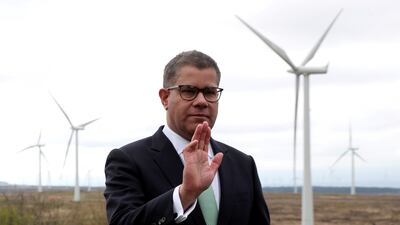Britain’s Cop26 chief Alok Sharma has defended his frequent air travel to lobby for climate action after critics accused him of setting a poor example.
Mr Sharma said his face-to-face talks were necessary as he tries to build consensus on climate action before November’s summit.
World leaders face mounting pressure to agree on decisive action at Cop26, with a UN report set to deliver stark warnings about global warming on Monday.
“We will see a very, very clear warning that unless we act now, we will unfortunately be out of time,” Mr Sharma told the Observer.
He said he was “throwing the kitchen sink” at reaching a deal and argued that it was vital to build personal relationships with foreign counterparts.
“I have, every week, a large number of virtual meetings but I can tell you that having in-person meetings with individual ministers is incredibly vital and actually impactful,” he said.
Mr Sharma has visited a host of countries, including Brazil, Nepal and Costa Rica, since becoming Cop26 president in January.
Some of his destinations were on the UK's "red list" for travel but Mr Sharma was exempted from entering quarantine.
David Lammy, a senior MP in the opposition Labour Party, described Mr Sharma’s travels as “one rule for them, another rule for us”.
“This amount of international travel when you are climate change minister feels to me bizarre, and feels to not be setting an example,” Mr Lammy told Sky News.
Christine Jardine, a Liberal Democrat MP, said Mr Sharma was the minister who should be encouraging people to reduce their carbon footprint.
“He’s flying all over the world when he could just as easily do these meetings by electronic means,” she said.
The UK says Cop26 should go ahead in person despite travel restrictions linked to Covid-19.
Delegates who cannot be vaccinated at home have been offered shots by the UK government so they can travel to Glasgow for the summit.

With Cop26 less than 100 days away, countries are under pressure to set out how they will curb their carbon emissions to limit global warming.
Monday’s report is expected to forecast how much carbon can be pumped into the atmosphere before global targets are breached.
Under the Paris Agreement, countries must strive to limit global warming to no more than 2°C, or preferably 1.5°C, above pre-industrial levels.
Extreme weather, such as bushfires in Greece and Turkey and last month’s floods in Germany, has pushed climate change further up the global agenda.
But dozens of countries missed an end-of-July deadline to submit their plans to the UN, which described the situation as “far from satisfactory”.
A recent G20 summit was hampered by disagreements over cutting emissions and ended with India writing its dissent into the final communique.
Wealthy countries have been criticised for failing to provide enough support to poor nations and for continuing to subsidise fossil fuels.


